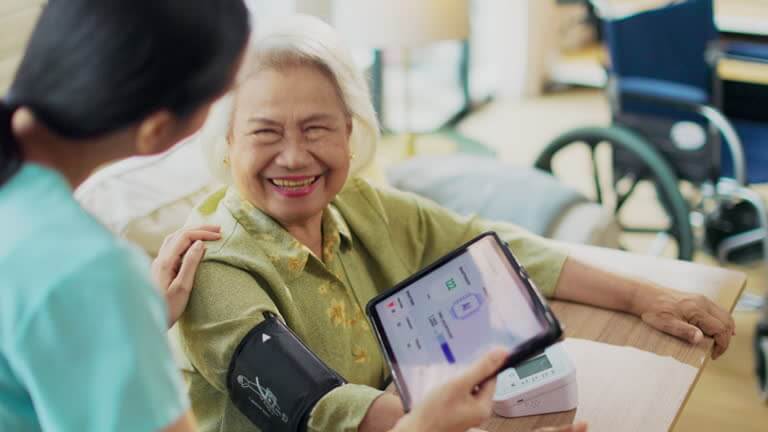
The School of Nursing launched its six-month “AI in Action Collaborative Series” this October, with an opening session led by Azizeh Sowan, PhD, RN, MSN, MSDA, MBA, FAAN, professor of nursing and an informatics expert.
Her presentation, “Current AI Landscape in Nursing and Health Education, Research and Practice,” set the tone for a new era of exploration that’s focused on how artificial intelligence is transforming nursing in all three areas.
“My background bridges nursing, health informatics, data science and business administration, with a long-standing focus on how technology can enhance patient safety, care quality and nursing education,” Sowan said. “What drew me to AI was its potential to amplify the human intelligence that defines nursing.”
Education’s moment of opportunity
While health systems are rapidly deploying AI in clinical settings, Sowan said nursing education remains in the early stages of acceptance.
“Nationally, AI adoption in nursing education is accelerating but remains uneven, and overall, its use in education is significantly behind its use in clinical practice and research,” she explained.
The School of Nursing is taking deliberate steps toward responsible integration through workshops, seminars and interdisciplinary partnerships to ensure AI is introduced with academic integrity, ethical awareness and a focus on improved student learning outcomes.
Where AI is making an impact
According to Sowan, three domains show the clearest impact: practice, education and research.
In clinical practice, AI-driven decision support systems and predictive analytics are enhancing patient safety by identifying early signs of a patient’s condition decline and streamlining health provider workflows.
“The U.S. Food and Drug Administration has cleared more than 1,000 AI, or machine-learning, medical devices, which stresses how deeply the technology has entered regulated healthcare,” Sowan said.
In education, AI is reshaping the classroom through simulation platforms, adaptive learning systems and academic writing assistants, helping faculty personalize learning to better develop students’ clinical reasoning skills.
And in research, Sowan said AI is “gaining traction for rapid evidence synthesis, big data analytics, predictive modeling and management of clinical trials,” enabling precision health and faster discovery.
Keeping AI human-centered
Even as AI’s capabilities expand, Sowan emphasized that technology must support, not replace, the human judgment and empathy central to nursing.
“We must frame AI as an assistant, not an authority,” she said. “Faculty can guide students to treat AI outputs as one input among many, subject to clinical context, patient values and professional ethics.”
Embedding reflective exercises on compassion and communication, she added, ensures the technology enhances rather than erodes the human connection essential to the heart of healthcare.
Preparing for the future
The most immediate opportunity for nursing educators, Sowan said, lies in using AI to enhance feedback, assessment and critical thinking, such as using AI chat tools in case discussions or debriefings. Yet she said challenges such as data bias, transparency, confidentiality and access are matters that need attention.
“AI is here to stay; what may seem like novel AI advancements these days will soon become the norm in practice, so we need to shift our attitude from exploring to actively engaging with and shaping AI applications, serving as designers, co-designers and informed users,” she said.
Looking ahead, Sowan envisions AI becoming seamlessly integrated into nursing workflows to aid in decision-making, documentation and patient communication.
“Nurses will serve as interpreters of AI insights, advocates for ethical implementation and leaders, together with patients, in interdisciplinary teams designing human-centered AI systems,” she said. “The nurse’s role will expand, not shrink, in the AI-enabled healthcare ecosystem.”
Her advice for health professionals, educators and students:
“Start with curiosity, not complexity. AI should serve a clear educational or research goal, not the other way around.”
A movement taking shape
The “AI in Action Collaborative Series” is about building “a community of informed, ethical and innovative educators, researchers and practitioners who are challenged to rethink traditional roles and define the future of nursing education, practice and research,” Sowan said.
“AI represents both an unprecedented opportunity and a profound responsibility for nursing,” she said. “By embracing AI with curiosity, ethical awareness and deliberate action, we can ensure that technology strengthens our profession and elevates quality of care, education and research.”
The lecture initiative, led by Sowan, Sara Gill, PhD, RN, and the Office of Nursing Research and Scholarship, will continue with sessions on Jan. 9, Feb. 13 and March 13, 2026.
The School of Nursing plans to extend the series, and faculty interested in presenting AI-related teaching or research innovations — particularly hands-on workshops for faculty, staff or students — are encouraged to contact Sowan at Sowan@uthscsa.edu or Patty Rodriguez, senior manager of research operations in the Office of Nursing Research and Scholarship, at rodriguezm63@uthscsa.edu.


